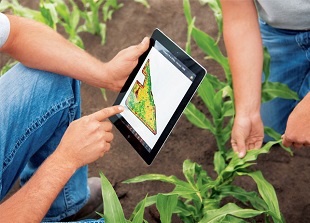FAO’s Ongoing Partnership with GODAN Action Project Works to Strengthen Capacity of Data Producers and Consumers in Agriculture and Nutrition -- Benefiting More Than 10,000 Participants with Goal to Continue

The lack of experience in data management or adoption of data driven services can limit the possibilities of digital transformation, which is vital for food security and nutrition. There is a strong need to strengthen the capacity of data producers and data consumers to better understand and begin to utilize open data to improve efficiency and effectiveness in agriculture and nutrition. Digital literacy has been identified as one of the key challenges in the Data for Development agenda developed by the European Commission.
In order to support the objective to increase the accessibility and visibility of research products in its member countries, the FAO Scientific Information and Digital Data for Innovation team created a partnership with the GODAN Action Project beginning in 2017. Through the ongoing partnership, more than 10,000 participants from more than 150 countries have benefited from capacity development opportunities to improve access to, and knowledge of information and data vital for food and agriculture.
All of the major capacity development activities brought together a large network of people from different regions with the interest in data use and produce in the agriculture domain. To continue the communication, and the exchange of information and experience among them, FAO provides a platform through Dgroups mailing lists. These lists are also used to keep them informed about the upcoming events, recent developments.
Learn more about the major capacity development activities:
Open Data Management in Agriculture and Nutrition Online Course
As part of the capacity development activities planned within GODAN Action project, FAO Team in collaboration with project partners including WUR, AgroKnow, AidData, GFAR, IDS, ODI and CTA, developed and delivered a MOOC (Massive Open Online Course) on Open Data Management in Agriculture and Nutrition. It was aimed to reach and train a higher number of participants, geographically dispersed globally, and independently from time and a physical place.
GODAN Action Open Data Management course was delivered five times to over 4,400 participants from 148 countries from November 2017 to December 2018. The course targeted three main work areas of GODAN action which are weather & climate data, land data and nutrition data. While the first three editions of the course were specifically on weather & climate data, the last two editions were customised for land and nutrition data respectively. You may find some testimonials from the participants below in the table.
In addition to those five editions of the course, it was also used in a blended learning methodology for a workshop delivered in Botswana in Research Data Alliance (RDA) Plenary 12 in November 2018. Participants of the workshop have been introduced to the fundamentals prior to the meeting, therefore the workshop was used for hands-on practices and real life examples.
At the end of the GODAN Action project, the course materials together supporting content have been published openly under a Creative Commons Attribution Sharealike licence to allow everyone to re-use the content for their own purposes.
Farm Data Management, Sharing and Services for Agriculture Development Online Course
Based on the content and experience of the GODAN Action online courses, in 2019, the FAO developed and delivered another online course funded by the Technical Centre for Agricultural and Rural Cooperation (CTA) with the Pan African Farmers’ Organisation (PAFO) as part of the Data4Ag project. The online course “Farm Data Management, Sharing and Services for Agriculture Development” was delivered twice from October to December in 2019. It accommodated over 5,000 participants from 153 different countries. It was aimed to strengthen the skills of professionals who use, manage data for the benefit of farmers and farmers organisations by exposing them to the topics of importance of data in the agriculture value chain and how new and existing technologies, products and services can leverage farm level and global data to improve yield, reduce loss, add value and increase profitability and resilience.
The course was able to create awareness of the products and services that have become a growth area, driving expectations and investments in ICT4ag including e-extension, precision agriculture and digital financial services. Furthermore, the course highlighted shared data principles, including FAIR and open data conceptual frameworks, while also emphasizing the legal and responsible ethical considerations for data rights and protections.
The learning materials developed specifically for the course are published publicly on this platform to be beneficial for a wider community.
The course materials developed specifically for the course are also published openly under a Creative Commons Attribution Sharealike licence to allow everyone to re-use the content and to be beneficial for a wider community.
For more information visit aims.fao.org.

